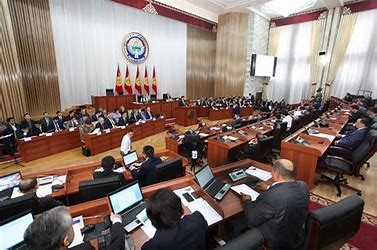Biskek issues new, even more restrictive media law
Žaparov's administration would like full power to refuse state registration to undesirable media without even having to go through the judgment of a court. Alarm from representatives of the news media at home and abroad.
Bishkek (AsiaNews) - The administration of Kyrgyz President Sadyr Žaparov has drawn up a new bill "on the mass media", which according to jurists from the international foundation Institute Media Policy (IMP) still contains several risks for freedom of expression in Kyrgyzstan.
The text contains contradictions with the national Constitution, in addition to the international norms of the Covenant on civil and political rights, and the observations of the ministries of culture and justice of Bishkek were not even taken into consideration.
The previous variant was presented in May 2023, and according to the IMP in the new proposal there are "excessive and baseless limitations on the activities of journalists". State bodies would be given full freedom to refuse state registration to unwelcome media, and also to block the activity of those already in possession of registration, without any particular legal complications.
Furthermore, the obligation for all websites to register as media outlets remains, increasing the number of institutions and officials involved and thus also causing further burdens on the state budget. There are also no clarifications on the procedures for registering sites, which know no borders on the internet.
The Ministry of Justice would receive the power to unilaterally cancel registration certificates, without the need to go to a court to obtain confirmation of this decision, which appears more authoritarian even than Russian laws, which at least formally pass through the competent judicial offices. This would be one of the most obvious contradictions with Kyrgyzstan's constitutional provisions, which defend the interests of editors, owners and entrepreneurs, as well as those of the user public.
The members of the IMP then turned to the Kyrgyz authorities, asking to entrust a new variant of the law to the competent commissions of the Žogorku Keneš, the Bishkek parliament, rejecting the text proposed by the presidential administration, presented to parliament last December 15th.
The authors of the project insist on the need to modify the current law on the media as it is outdated and unsuitable to respond to the "challenges of the contemporary world" and the needs of Kyrgyz society.
Many jurists and experts, as well as representatives of the world of information in the country, have repeatedly criticized the previous (five) variants of the project, considered threats to freedom of speech and the parameters of a democratic society.
The Venice Commission of the Council of Europe also gave a negative assessment to the bill, which would undermine the rights of free expression of opinions and would entail serious consequences for the activities of the media, which exercise "a role of social control" on life of the country.
The Kyrgyzstan Human Rights Guarantor Agency itself asked last November to rewrite the text of the law, the first variant of which dates back to October 2022, and the speaker of parliament, Nurlanbek Šakiev, assured that the Žogorku Keneš "will evaluate the bill very carefully, taking into account the proposals of journalists and citizens".
27/01/2023 09:41
16/10/2023 10:02
24/01/2007







.png)










